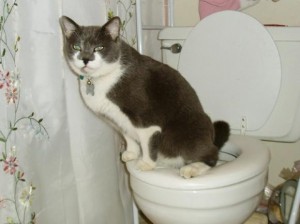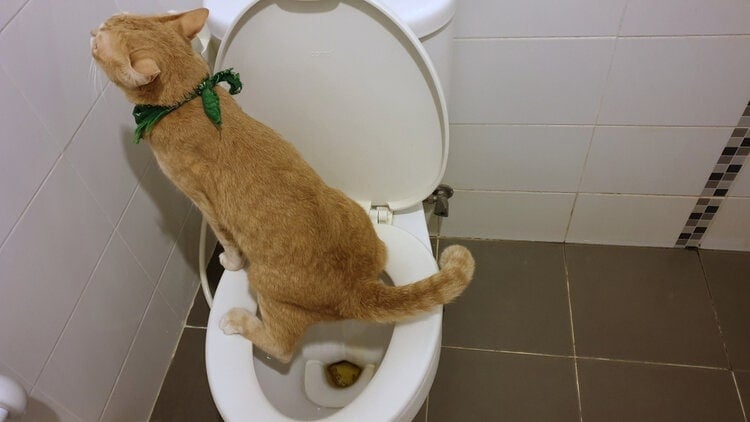Prevent Bathroom Disasters: Don't Flush Cat Poop Down Your Toilet - Expert Advice
Prevent Bathroom Disasters: Don't Flush Cat Poop Down Your Toilet - Expert Advice
Blog Article
This article in the next paragraphs relating to Don’t flush cat feces down the toilet is truly interesting. Give it a go and make your own final thoughts.

Introduction
As cat owners, it's essential to be mindful of just how we dispose of our feline friends' waste. While it might appear practical to flush cat poop down the toilet, this technique can have damaging repercussions for both the environment and human wellness.
Alternatives to Flushing
Luckily, there are much safer and more liable methods to deal with pet cat poop. Think about the following options:
1. Scoop and Dispose in Trash
The most usual method of taking care of feline poop is to scoop it right into a naturally degradable bag and toss it in the trash. Make sure to make use of a devoted clutter scoop and get rid of the waste quickly.
2. Use Biodegradable Litter
Go with biodegradable feline clutter made from materials such as corn or wheat. These trashes are environmentally friendly and can be securely gotten rid of in the garbage.
3. Hide in the Yard
If you have a yard, consider burying feline waste in an assigned location far from veggie gardens and water resources. Make certain to dig deep adequate to prevent contamination of groundwater.
4. Set Up a Pet Waste Disposal System
Purchase a family pet garbage disposal system particularly created for feline waste. These systems utilize enzymes to break down the waste, decreasing odor and ecological effect.
Wellness Risks
In addition to environmental issues, flushing feline waste can likewise position health threats to people. Cat feces might consist of Toxoplasma gondii, a parasite that can create toxoplasmosis-- a possibly serious illness, specifically for expecting females and individuals with damaged immune systems.
Ecological Impact
Flushing pet cat poop introduces unsafe microorganisms and bloodsuckers into the water, posing a considerable threat to aquatic ecological communities. These pollutants can adversely influence marine life and compromise water high quality.
Verdict
Responsible animal possession expands past providing food and shelter-- it likewise includes appropriate waste administration. By avoiding purging pet cat poop down the commode and opting for alternate disposal techniques, we can lessen our environmental footprint and safeguard human health and wellness.
Why You Should Never Flush Cat Poop Down the Toilet
A rose by any other name might smell as sweet, but not all poop is created equal. Toilets, and our sewage systems, are designed for human excrement, not animal waste. It might seem like it couldn’t hurt to toss cat feces into the loo, but it’s not a good idea to flush cat poop in the toilet.
First and foremost, assuming your cat uses a litter box, any waste is going to have litter on it. And even the smallest amount of litter can wreak havoc on plumbing.
Over time, small amounts build up, filling up your septic system. Most litter sold today is clumping; it is made from a type of clay that hardens when it gets wet. Ever tried to scrape old clumps from the bottom of a litter box? You know just how cement-hard it can get!
Now imagine just a small clump of that stuck in your pipes. A simple de-clogger like Drano isn’t going to cut it. And that means it’s going to cost you big time to fix it.
Parasitic Contamination
Believe it or not, your healthy kitty may be harboring a nasty parasite. Only cats excrete Toxoplasma in their feces. Yet it rarely causes serious health issues in the cats that are infected. Most people will be fine too if infected. Only pregnant women and people with compromised immune systems are at risk. (If you’ve ever heard how women who are expecting are excused from litter cleaning duty, Toxoplasma is why.)
But other animals may have a problem if infected with the parasite. And human water treatment systems aren’t designed to handle it. As a result, the systems don’t remove the parasite before discharging wastewater into local waterways. Fish, shellfish, and other marine life — otters in particular — are susceptible to toxoplasma. If exposed, most will end up with brain damage and many will die.
Depending on the species of fish, they may end up on someone’s fish hook and, ultimately on someone’s dinner plate. If that someone has a chronic illness, they’re at risk.
Skip the Toilet Training
We know there are folks out there who like to toilet train their cats. And we give them props, it takes a lot of work. But thanks to the toxoplasma, it’s not a good idea.

Do you enjoy more info about How to Dispose of Cat Poop and Litter Without Plastic Bags? Try leaving a remark below. We will be interested to know your insights about this write up. Hoping that you come back again soon. Do you know someone else who is truly interested in the subject? Please feel free to share it. I treasure reading our article about How to Dispose of Cat Poop and Litter Without Plastic Bags.
Click Here Report this page